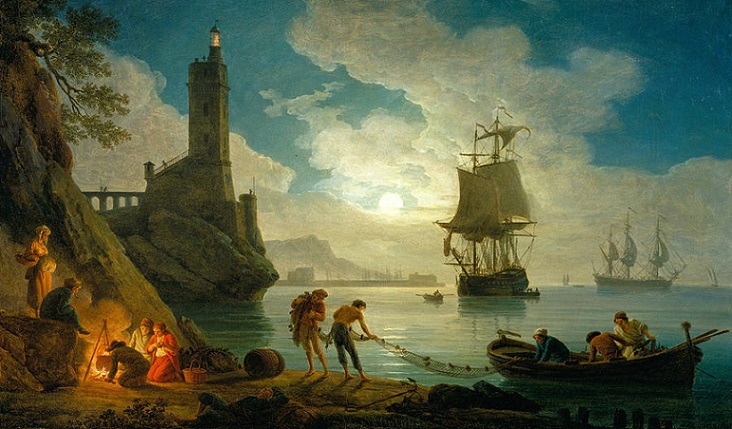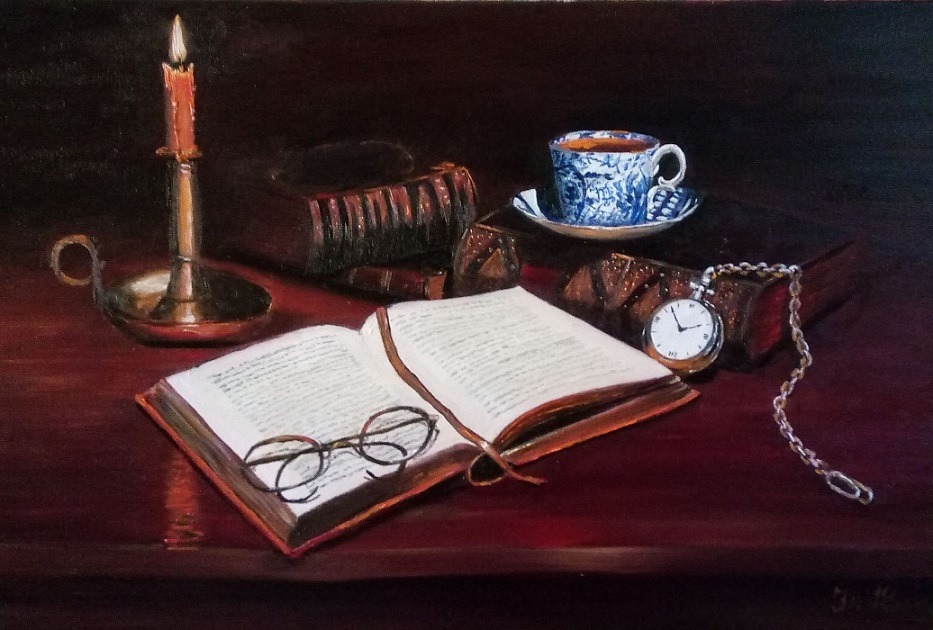translation from Italian by Luigi Pagano
Maybe because you are the image of eternal peace
O evening, you are welcomed by me with open arms
when the summer clouds and the gentlest breeze
beguile me with fascination and plenty of charm
or in winter, when the sky full of snow and ill at ease,
to the universe brings dark nights and heavy storms.
I long for you and as you descend you will release
sweetness to the secret parts of my soul in return.
My thoughts keep wandering towards that moment
that leads to nothingness as the wretched time flies
together with all my anxieties and painful torment
with which throughout my life I had to agonize
and, while I contemplate your peace, I am content
to placate the combative spirit that in me lies.
© Luigi Pagano 2019
Alla Sera
Forse perché della fatal quïete
Tu sei l’imago a me sì cara vieni
O sera! E quando ti corteggian liete
Le nubi estive e i zeffiri sereni,
E quando dal nevoso aere inquïete
Tenebre e lunghe all’universo meni
Sempre scendi invocata, e le secrete
Vie del mio cor soavemente tieni.
Vagar mi fai co’ miei pensier su l’orme
che vanno al nulla eterno; e intanto fugge
questo reo tempo, e van con lui le torme
Delle cure onde meco egli si strugge;
e mentre io guardo la tua pace, dorme
Quello spirto guerrier ch’entro mi rugge.
Luigi Pagano, born in Italy, has lived in England since 1961. Married, has two daughters and lives in Cheshire. He has published three poetry collections entitled “Idle Thoughts”, “Reflections” and “Poetry on Tap.” The anthologies “Sporting Chance” (Boho Press) and “Voices From the Web” 2, 3. 4 and 5 (UKA Press) include some of his work. He was also featured in “Take Five Poets”and “Kiss of the Sun” (I*D Books), “Land of Stories” (Bar None books), La Fenêtre magazine. He is a regular contributor to ABCtales.com, UKAuthors.com and Poetry24.co.uk
















Very beautiful imagery. Doesn’t sound like a translation. The choice of words and flow make it sound like a original poem.
Many thanks for your kind words, Mahathi, much appreciated.
Best wishes, Luigi.
In line 12 of the Italian text, the last word should be /strugge/, not “struggle.” Perhaps it could be corrected.
Thanks for pointing out the typo. I see that it has been corrected.
Best wishes, Luigi.
This is, in my view, a delightful translation, with great sensitivity to the qualities of the original and to the difficult matter of transmitting them in English. My Italian other half agrees, saying “This is beautiful! Both in Italian and English”. It very well deserves the prize it received in the 2019 Translation Competition.
Delighted that you and your Italian other half have given the seal of approval to this translation of mine. My thanks and regards to you both.
Luigi.
We owe Mr. Pagano a debit [sic] of gratitude for his bringing his translation of Foscolo’s sonnet to SCP. It has been so long since I contemplated Italian Romantic Foscolo, particularly his “Dei Seplocri”, that it is nice Mr. Pagano has drawn attention to another work of his. For me it is a strange feeling to apostrophize, especially time, as Foscolo does with evening; but there is a power to it, a power and a freedom that can be intoxicating. Such apostrophizing gave rise to this bilding by Raúl de Cwesibe, “To Night”:
Oh, lovely Night, you fabricator of the Day,
embellishing our world with your crazed sleights of hand.
You send the bright, full moon to light our merry way;
and mountains flatten, seas dry up, at your command.
Oh, you inhabitor of hollow, empty minds,
you alchemist of Love, sweet chimera unmanned,
although you cannot see, because you’ve closed the blinds,
we are enamored of the beauties that you bring.
Your works are dark, and stark, though they’re amazing finds;
they leave us cold and cautious, weary, wondering.
Half of my life is yours, whether I sleep or wake;
asleep, I’m unaware, awake, I’m wandering.
For me, one of the ironies of poems of mine being published anywhere, after decades of trying, is that the first poems I ever had published were in an Italian literary magazine, my poems on Umberto Saba and Umberto Eco (when he was alive). Sometimes a person in one culture is not appreciated by those of his or her own culture, but can find an audience in another; and such was my case. For that reason, inter alia, I have an abiding affinity to Italian literature.
Luwese Becardi, grateful for your appreciation, Many thanks.
Luigi
I cannot think that *fatal quïete* corresponds to “eternal peace”. To translate it thus in the very beginning of the poem misdirects the reader to a far more cosy relationship with death than is suggested by “*agar mi fai co’ miei pensier su l’orme che vanno al nulla eterno*”
Your comment is greatly appreciated. Thank you.
Sometimes feedback is useful as it makes one re-examine and perhaps re-assess what one has written.
I was in my teens when I first came across Ugo Foscolo and seventy years later still remember the punctilious scrutiny and analysis of his work we were required to undertake.
I understand that you are uncomfortable with a certain line of my translation you believe it to be misleading.
When translating one has to be very careful in the choice of words.
In “Alla Sera” two words are pivotal at the beginning of the poem.
fatal and quiete. In Italian these two words can have different meanings, i.e.
fatal = fateful, fated, destined, inevitable
quiete = tranquillity, calm, rest, peace
I do not intend to have a debate to justify my interpretation, so I refer you to what has been written elsewhere:
https://www.italyheritage.com/learn-italian/literature/foscolo-alla-sera.htm
Here it can be seen how the first few lines were translated
Maybe because of the final rest
you are an image, to me so dear you come
O Evening!
and how the poem is described
“Alla Sera” is widely considered the most beautiful of the 4 major (on a total of 12 sonnets) sonnets by Ugo Foscolo. The silence of the evening, when all life is asleep, suggests to the poet the image of death to which he longs, as if this only could bring him to peace”